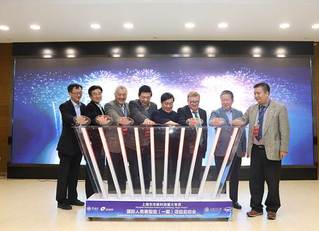“International Human Phenome Project (Phase I)” Launched in Shanghai
On March 25th, the launching ceremony of the “International Human Phenome Project (Phase I)”, supported by the first Special Funds for Major Project of Shanghai Municipal Science and Technology, was held in Fudan University. Fudan University would lead this project and cooperate with experts from Shanghai Jiao Tong University, Shanghai Institute of Measurement and Testing Technology, and Shanghai Institutes for Biological Sciences of CAS.
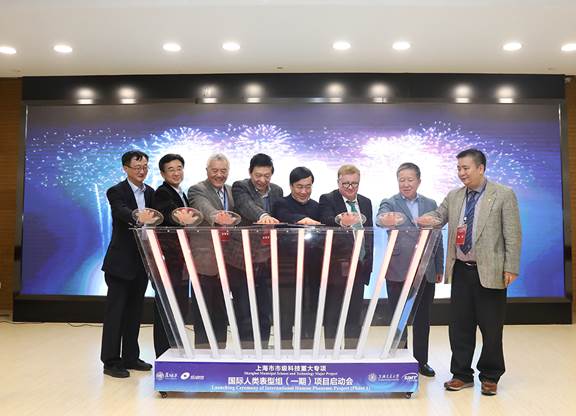
At the ceremony, Xu Ningsheng (President of Fudan University and Academician of CAS), Yang Shengli (Academician of CAE), Zhao Guoping (Academician of CAS), Wang Chen (Academician of Chinese Academy of Medical Sciences, Academician of CAE and President of Peking Union Medical College), Jeremy Nicholson (Academician of the Royal Academy of Medical Sciences), Cao Jianlin (former Vice Minister of the Ministry of Science and Technology), Jing Lei (Director of Shanghai Municipal Commission of Health and Family Planning) and Jin Li (the project’s Chief Scientist, Vice President of Fudan University and Academician of CAS) jointly initiated the project. The members of the Project Strategy Steering Committee, the Academic Committee and the Ethics Committee accepted letters of appointment during the ceremony. More than 20 academicians and over 100 scientists in this field came to witness this event.

As an important move to make Shanghai aglobally influential center of science and technology innovation, the project would gather more than 100 scientists from home and abroad.
Through cross-scale, multidimensional studies on the phenotypic characteristics of the human body from macroscopic to microscopic levels, an advanced research platform for the human phenome would be established for the first time in the world. In addition, the standard technical measuring system for the phenome of healthy people in China would be fully formulated, and the first Graph and Database for the phenome of healthy people in China would also be constructed.
From Genetic Group to Phenotypic Group: Make Utmost Efforts to Unravel the Secrets of Human Life
Health is the most fundamental need of human beings. The report of the 19th CPC National Congress pointed out that “people’s health is an important symbol of the prosperity and power of the nation”, and put forward the “implementation of A Healthy China Strategy”. Although “health” is a well-known concept among people, questions as to the standard of health for Chinese and ways to formulate the standard are to be answered urgently.
In addition, despite advances of medical technology, malignant tumors, metabolic diseases and respiratory diseases are still major factors that threaten human health. The causes of these diseases are complex. Although a large number of studies on disease mechanisms have been conducted, the real causes of these diseases still remain unclear and require further exploration by scientists.
Since the Human Genome Project was completed in 2001, life sciences and medical researches have entered the “post-genome era”. However, the current research on how the highly condensed genetic information evolves into the final complex manifestation (in other words, the connection between phenotypes) are still in the early stage of exploration. The international scientific community has found that it is necessary to study the human phenotypes comprehensively, to supplement the other half of the required information, and to conduct researches on the multi-level correlation and integration of genes, environments, and phenotypes. Solving the problem of the genetic-phenomic correlation will help prevent diseases and propose corresponding health care plans, which will propel the development of medicine and meet the needs of population health.
Chen Runsheng, Academician of CAS, pointed out, “The Human Phenome Project occupies a leading strategic position after the completion of the Human Genome Project. This project will provide a breakthrough and a new paradigm for biomedical researches and will lead the development of biomedical science.”

According to Jin Li, the project’s Chief Scientist, the Human Phenome Project will fully reveal the key information needed for unraveling the secret of human life, explore the “basic standard of health” and the regulatory objectives of medical intervention. Through attribution researches, the diseases mechanisms will be clarified, which will provide vital clues to and guidelines for disease prevention and intervention. It will also help discover drug targets, thereby accelerating the development of the pharmaceutical industry. The landmark achievement of this project will be drawing the first “comprehensive reference graph of the phenome of Chinese people”, which will provide the basis for formulating the “health standard for Chinese”.
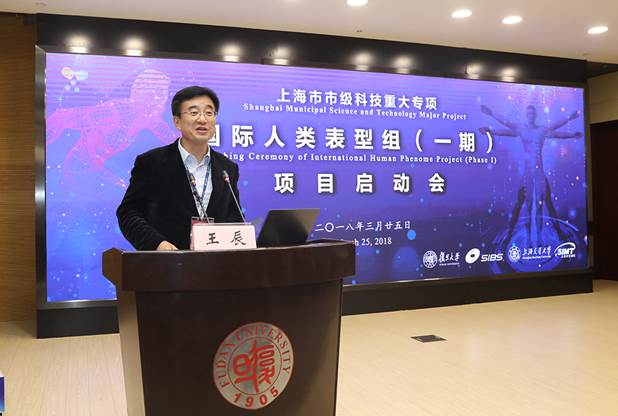
Wang Chen, Academician of CAE, attended the ceremony and delivered a speech: The large population of Chinese people provides numerous samples of various phenotypes. Establishing measurement standards and technical systems for the phenome of healthy people in China is essential to the development of precision medicine. As one of the participants of this project, he said “The collection of and research on Chinese people’s phenotypic data is of great significance. It will provide benchmark indicators for following phenotypic studies on patients and talents. What is more, it can provide data support for the development of personalized medicine and translational medicine, and also a scientific basis for the realization of ‘A Healthy China’.”
From Priority Layout to Occupying “Highland”: Actively Boost the Construction of Shanghai Technology & Innovation Center
Studying the human phenotypic group has become a consensus in the academic community, and developed countries are all planning relevant international projects. The right to formulate international standards, international academic discourse power, and the leadership of industrial development are what every country wants to contend for.
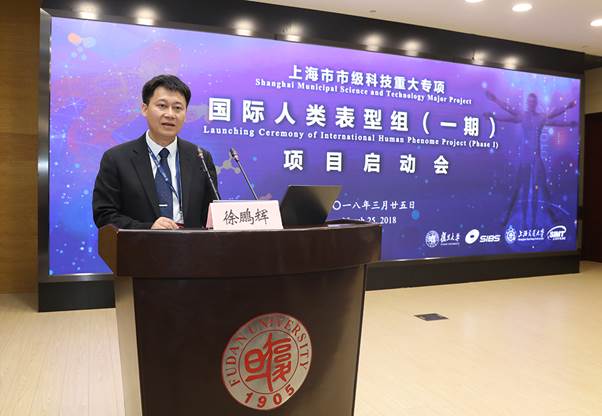
“China’s science and technology are generally in the three “run” pattern (standing for “Following”, “Running Abreast” and “Leading” in Chinese), but the internal structure is constantly changing and the possibility of ‘leading’ will gradually increase.” said Xu Penghui, Director of the International Cooperation Division of the China Biotechnology Development Center of the Ministry of Science and Technology. He showed his high expectation for the Human Phenome Project when delivering a speech at the ceremony.
In April 2016, the “Program of Shanghai’s Systematically Promoting Comprehensive Innovation Reform Experiments and Accelerating the Construction of a Globally Influential Technology Innovation Center” approved by the State Council included the “International Human Phenotypic Group” as a major scientific foundation project with top priority. This paved the way for the International Human Phenome Project.
According to Xu Ningsheng, in July 2017, Fudan University set up a research institute for the human phenotypic group; in September 2017, to help construct a science and technology innovation center with global influence in Shanghai, Fudan University proposed to build “Zhangjiang-Fudan International Innovation Center” in Zhangjiang Science City. “One Plan, Two Centers” was also initiated by Fudan University. “One Plan” refers to the “International Human Phenome Project”, the implementation of which will help Shanghai making breakthroughs in life sciences.
In November 2017, the Shanghai Municipal Government approved the “International Human Phenome Project (Phase I)” led by Fudan University as the first batch of Municipal Science and Technology Major Projects, with funding of nearly 560 million yuan. The goal of this project is to systematically characterize the phenotypic characteristics of healthy, sub-healthy, sick and talented people, and to integrate heredity and growth research with health management and medical applications. The project will develop personalized health care plans, which can provide original achievements for the development of precision medicine, precise health and the great health industry.
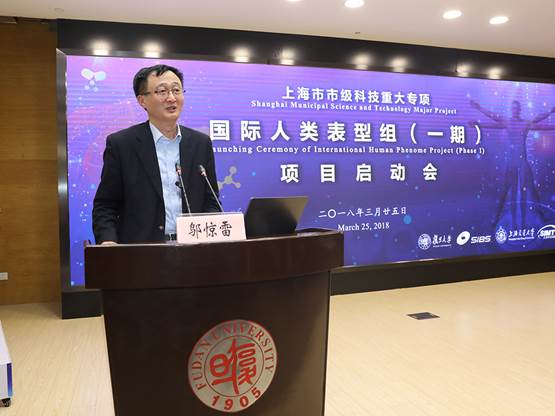
Zhai Jinglei pointed out that the implementation of this project will not only make effective use of big data of genetics and phenotypes information that have been accumulated in Shanghai, but will also validate the innovative development mode that new R&D institutions undertake major projects, accumulate innovative resources, attract innovative teams, accelerate the result transformation and support the industrial transformation. This will promote Shanghai to become an international frontier and academic center for human phenome research, and significantly enhance the global influence of Shanghai’s life sciences research. The construction and development of Shanghai Biopharmaceutical Strategic Emerging Industry, Zhangjiang Science City and Shanghai Science & Innovation Center will also benefit from this project.
From Scientists to Volunteers: International Cooperation Secures the Future Human Health
Unity makes strength. The “International Human Phenome Project (Phase I)” has attracted many scientists. The project has hired more than 40 Chinese and foreign experts, including CAS Academician Han Qide, to serve as members of the Strategic Steering Committee. Han Qide, 2015 Nobel Prize Winner in Chemistry Tomas Lindahl, and Yang Shengli have been hired as Honorary Directors of the Strategic Steering Committee; He Fuchu (Academician of CAS and the Head of International Human Liver Protein Group), George Church (Academicians of the American Academy of Sciences, American Academy of Engineering and American Academy of Arts and Humanities) and Jeremy Nicholson have been hired as Co-Directors of the Strategy Steering Committee; Li Peng, Academician of CAS, will serve as Director of the Academic Committee; Wang Guoyu, Professor of Philosophy of Fudan University, will serve as the Director of the Ethics Committee.
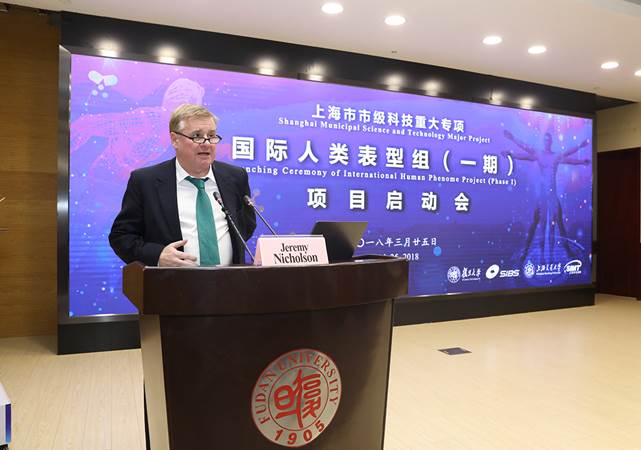
Jeremy Nicholson is hailed as the “father of metabolomics” and he said in his speech, “The study on the human phenotypic group not only needs to integrate the multidisciplinary strengths, but also requires the global collaboration amongscientists because it is human’s common cause.” At the same time, he believed, “This important sci-tech project launched today will make the research of the human phenotypic group in the spotlight of international research, and will help China to be a world leader in life sciences.”
It is said that Fudan University has strong strength and foundation to conduct research on the human phenotypic group. The team led by Jin Li established a queue of 200,000 healthy people in Taizhou 10 years ago, and continued to keep track of these people. It also developed phenotypic detection technology, which was leading in the world. As early as in 2015, it undertook the project of the “National Survey of Anthropologicallys Phenotypic Characteristics” of the Ministry of Science and Technology, which laid a good foundation for the International Human Phenome Project.
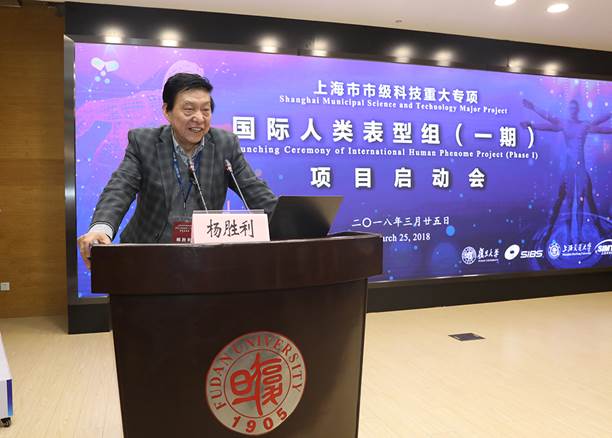
“Comprehensive interpretation of human life and health and the establishment of our own Chinese health standards require not only the concerted efforts of scientists, but also public participation.” Yang Shengli, Honorary Director of the Strategy Steering Committee, said that this project would need volunteers to be involved. Volunteers would participate in the accurate physical examination, providing valuable data for the project. It is said that systematic measurement of phenomes will be officially launched in July this year.


